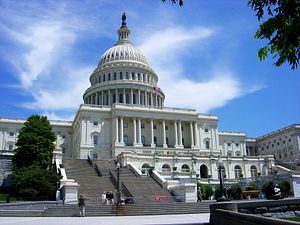On February 28, the Taiwan Travel Act passed the U.S. Senate by unanimous consent. That followed similarly unanimous House passage on January 9, 2018, nearly a year after the bill was introduced by Representative Steve Chabot (R-OH). A previous version of the bill was introduced in 2016 by Chabot in the House and Senator Marco Rubio (R-FL) in the Senate.
The White House has not publicly commented on whether or not President Donald Trump will sign the bill into law, but as Reuters noted, “It would be unusual for a president to veto a measure that passed unanimously.”
The Taiwan Travel Act aims to expand the scope of official U.S.-Taiwan exchanges, long a sensitive issue in the U.S.-China relationship. The Act includes Congress’ finding that “Since the enactment of the Taiwan Relations Act, relations between the United States and Taiwan have suffered from insufficient high-level communication due to the self-imposed restrictions that the United States maintains on high-level visits with Taiwan.”
In response, the Taiwan Travel Act recommends that the U.S. government “allow officials at all levels of the United States Government, including Cabinet-level national security officials, general officers, and other executive branch officials, to travel to Taiwan to meet their Taiwanese counterparts” as well as allowing Taiwan’s top officials to enter the United States. The act also encourages the Taipei Economic and Cultural Representative Office (TECRO), Taiwan’s de facto embassy, to “conduct business in the United States,” including with members of Congress and government officials.
Notably, however, the Taiwan Travel Act does not require any of this to be done; it suggests that these measures “should be the policy of the United States” (emphasis added). That leaves the ultimate implementation, or lack thereof, to the discretion of the Trump administration (and future administrations) should the act become law.
Julian Ku, writing for Lawfare, argued that the act, despite its lack of legal force, was nonetheless significant. “Nothing in U.S. or international law currently prevents U.S. officials from meeting with Taiwanese government officials,” Ku noted. “But the U.S. government avoids such meetings out of deference to China…”
Now, Ku explained, the unanimous passage of the Taiwan Travel Act by Congress could provide “diplomatic and political cover” for changing that long-standing policy. “U.S. administrations will cite this law as the reason they must do something that China does not like,” Ku predicted. In other words, the Trump administration can argue that Congress has forced its hand on the issue.
Taiwan’s President Tsai Ing-wen welcomed the Senate’s passage of the Taiwan Travel Act, tweeting that the act “symbolizes the US Congress’ longstanding support for Taiwan.”
“The Taiwan-U.S. partnership is a key pillar of peace & stability for the Indo-Pacific region & I am grateful to all members of Congress who supported this important bill,” she added.
Taiwan’s Ministry of Foreign Affairs also thanked Congress for its support of U.S.-Taiwan relations and pledged to “develop an even more substantial cooperative relationship” with the United States.
China, meanwhile, was predictably displeased. Beijing requires all foreign governments with which it has diplomatic relations to hew to a “one China” policy, which means forgoing an official relationship with Taiwan (formally the Republic of China, but claimed by the People’s Republic of China in Beijing as part of its territory). When asked about the Taiwan Travel Act, foreign ministry spokesperson Hua Chunying told reporters, “Some of the act’s clauses, though not legally binding, still severely violate the one-China principle and the three joint communiqués between China and the U.S. China is strongly dissatisfied with that and also firmly opposes it. We have lodged stern representations with the U.S. side.”
Hua urged the United States to “stop pursuing any official ties with Taiwan or improving its current relations with Taiwan in any substantive way.” She warned that Washington “must handle Taiwan-related issues properly and cautiously so as to avoid causing any major disruption or damage to the China-U.S. relations.”
It’s unclear, however, just what sort of “disruption or damage” would ensue should the United States send a high-ranking official to Taiwan. The last Cabinet-level official to visit Taiwan was Environmental Protection Agency administrator Gina McCarthy in 2014, sparking a protest from China but not much in terms of concrete repercussions. However, that visit occurred under Taiwan’s previous Ma Ying-jeou administration, which Beijing viewed more favorably. Currently, cross-strait relations are on ice due to Beijing’s displeasure over Tsai’s refusal to embrace the “one China” framework as stipulated in the “1992 Consensus.”
Against that backdrop, Beijing may respond more forcefully to attempts to advance ties between the United States and Taiwan. In the past, China has mainly demonstrated its displeasure with U.S. outreach to Taiwan by limiting or cutting off its own official exchanges with Washington. In 2010, for example, China severed military-to-military ties with the United States after a U.S. arms sale to Taiwan; the freeze lasted nearly a year.

































